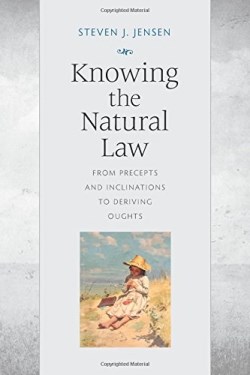Steven Jensen
Showing all 3 resultsSorted by latest
-
Knowing The Natural Law
$34.95Add to cartRecent discussions of Thomas Aquinas’s treatment of natural law have focused upon the “self-evident” character of the first principles, but few attempts have been made to determine in what manner they are selfevident. On some accounts, a self-evident precept must have, at most, a tenuous connection with speculative reason, especially our knowledge of God, and it must be untainted by the stain of “deriving” an ought from an is. Yet Aquinas himself had a robust account of the good, rooted in human nature. He saw no fundamental difference between is-statements and ought-statements, both of which he considered to be descriptive. Knowing the Natural Law traces the thought of Aquinas from an understanding of human nature to a knowledge of the human good, from there to an account of ought-statements, and finally to choice, which issues in human actions. The much discussed article on the precepts of the natural law (I-II, 94, 2) provides the framework for a natural law rooted in human nature and in speculative knowledge. Practical knowledge is itself threefold: potentially practical knowledge, virtually practical knowledge, and fully practical knowledge. This distinction within practical knowledge, typically overlooked or underutilized, reveals the steps by which the mind moves from speculative knowledge all the way to fully practical knowledge. The most significant sections of Knowing the Natural Law examine the nature of ought-statements, the imperative force of moral precepts, the special character of per se nota propositions as found within the natural law, and the final movement from knowledge to action.
-
Living The Good Life
$24.95Add to cartLiving the Good Life presents a brief introduction to virtue and vice, self-control and weakness, misery and happiness. The book contrasts the thought of Aquinas with popular views, such as moral relativism, values clarification, utilitarianism, Kantian deontology, and situation ethics. Following the Socratic dictum “know thyself,” Steven J. Jensen investigates the interior workings of the human mind, revealing the interplay of reason, will, and emotions. According to Aquinas, in a healthy ethical life, reason guides the emotions and will to the true human good. In an unhealthy life, emotional impulses distort the vision of reason, entrapping one in futile pursuits. In the human struggle to gain self-mastery, a person must overcome the capricious desires that enslave him to false goods.
Jensen ably guides readers through Aquinas’s philosophy and explains the distinction between the moral and intellectual virtues. The moral virtues train our various desires toward the true good, helping us discard our misguided cravings and teaching us to enjoy what is truly worth pursuing. The virtue of justice directs our hearts to the good of others, freeing us from egoism in order to seek a good shared with others. The intellectual virtues train the mind toward the truth, so that we can find fulfillment in human understanding. Most important, the virtue of prudence directs our deliberations to discover the true path of
life.Intended as a text for students, beginners of philosophy will gain access to a key aspect of Aquinas’s thought, namely, that true happiness is realized not in the animal life of passion and greed but only in the reasonable pursuit of human goods, in which we find true peace and rest from the distractions of this world.



